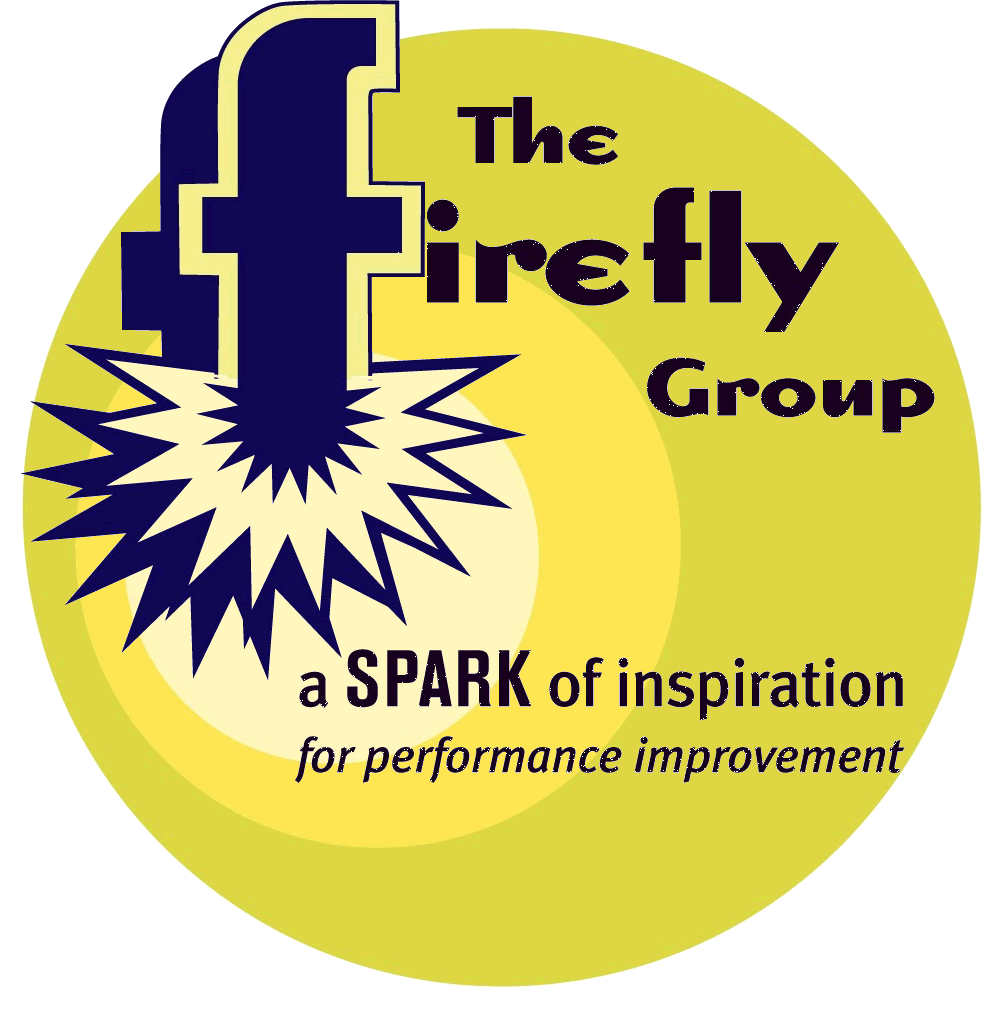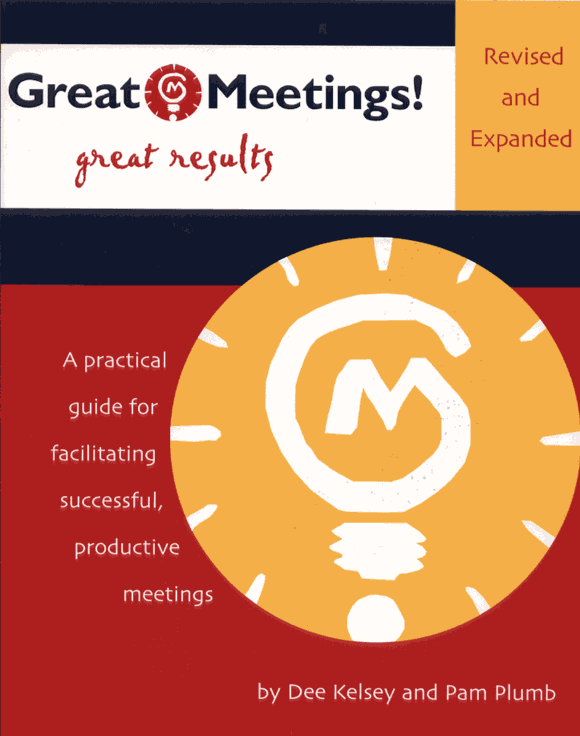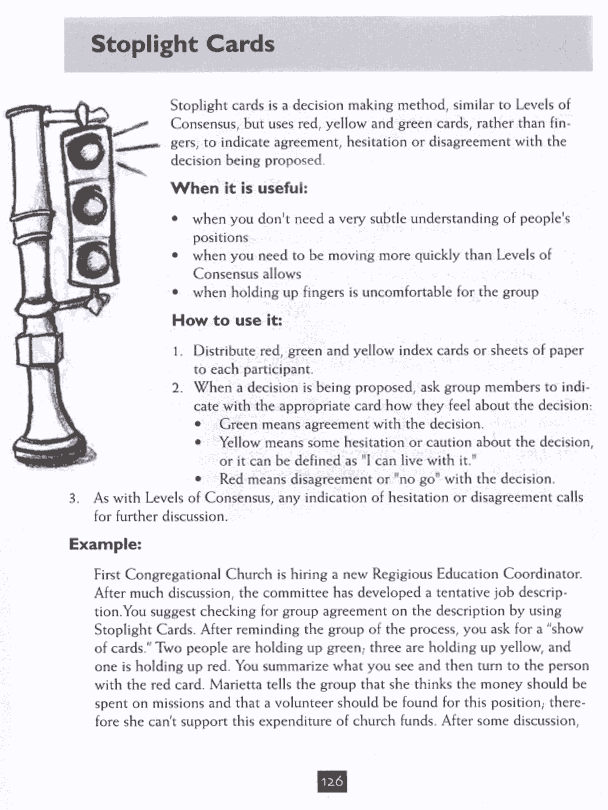


April 2009
In this Issue:
|
Say
It Quick |
Discoveries bits of serendipity to inspire and motivate |
Ideas fuel for your own continuous learning |
Activities tips and tricks you can try today |
| What's Your Contribution? | Great Meetings! Great Results | Facilitate or Participate? | The Best Meeting Ever! |
Anytime there's a job to do that takes more than one person to get done, you'll probably need a meeting. In this 99 Word Story we highlight one ongoing problem with meetings then suggest some solutions in Discoveries.
What’s Your
Contribution?
Bob hated meetings. It was evident in his tone of voice, his body language,
his demeanor, and his droll, sarcastic comments. He was famous for his negative
opinion about meetings. Yet as head of his department, attending and leading
meetings was a big part of his responsibility.
Surprisingly, Bob taught me the secret to having a great meeting. He would often leave a meeting grumbling that he hadn’t gotten anything out of it. But I noticed that he hadn’t put anything into the meeting either!
If you want a great meeting, plan to make a contribution!
 Great
Meetings! Great Results
Great
Meetings! Great Results
by Dee Kelsey and Pam Plumb
If you've ever met someone like Bob in this month's 99
Word story, you'll appreciate Great Meetings!
Great Results by Dee Kelsey and Pam Plumb. This book packs everything
you need to create a successful meeting between two covers – with plenty of
examples, charts, checklists, and illustrations to make it an engaging read.
The authors draw upon over 40 years of collective experience as mediators,
organizational development consultants, process consultants, trainers, politicians,
and facilitators to highlight the essential skills and critical tools necessary
for groups to work harmoniously and productively.
The greatest
strength of Kelsey's and Plumb's book is the attention it gives to both process
and content with an emphasis on balancing the two. A meeting where rush decisions
are made without full input from all group members is as unsatisfactory as
one that's all talk and no action. Kelsey and Plumb write about the responsibility
facilitators have to design a meeting, promote positive communication, manage
conflict, and intervene when appropriate. In addition, several chapters are
devoted to specific tools facilitators can use to help groups generate, evaluate,
and decide upon ideas all while maximizing participation. 
Kelsey and Plumb point out that the first step to a great meeting is determining whether a meeting is even necessary. Do you need interactive communication to discuss ideas, establish group ownership of a problem, generate team commitment, or make decisions? Then plan a meeting! If not, then make Bob and all the other meeting-naysayers happy and send a memo instead!
Here's a sample activity from the book. Click it to see a larger image.
Learn more about Great Meetings! Great Results at www.greatmeetingsinc.com.
Facilitate
or Participate?
One of the most interesting discussions in Great Meetings! Great Results explores
four different roles a facilitator might take on. The authors describe these
roles as:
The authors offer helpful coaching to manage whichever role one might be called to perform. And with any degree of facilitator role you find yourself playing, at some point you will need to reduce the likelihood of appearing partial. Kelsey and Plumb suggest the following steps to maximize a collaborative group process:
Considering these different aspects of facilitation has made me realize that there are opportunities to make a meeting more productive even if you don't formally hold the facilitator's role. Anyone familiar with collaborative processes and tools can, in the moment, suggest a better way to make decisions, resolve conflict, or invent ideas. When the “official” facilitator is aware of this dynamic, the group can begin to take more responsibility for its work – a first step toward empowerment!
The Best Meeting
Ever!
“I could never do your job. I can't stand meetings!”
That's a comment my wife has made more than once. And it's one I've heard many people echo. As difficult as meetings can be they are a necessary part of getting things done so why not make the most of them? Rather than expecting the worst, we can plan for the best.
Try this experiment: Before your next meeting, consider your role. What will you be expected to do? Why have you been invited? If you don't know the answer to these basic questions, make sure you find out before you go. (If no one can tell you, perhaps you can even excuse yourself!)
Whether you're the leader, the facilitator, or an average participant, you can choose to either make a difference or be bored out of your mind. To plan for the former and avoid the latter, think about what you have to contribute. During the meeting, look for opportunities to offer your insights, observations, ideas, or critical thinking. (And don't forget that paying close attention while keeping an appropriate silence might also be valuable for a successful meeting!)
For your experiment, make this assumption: if you didn't have something to contribute to the meeting, you wouldn't have been invited. Look for a chance to share your unique offering and I'll wager the meeting will be one of your best. When you make that discovery,
Read previous
issues. Click Archives!
To add or delete your name to our mailing list, email
with a short note in the subject line.
We want this newsletter to be practical, succinct, and thoughtful. If you have suggestions about how we can meet these criteria, please let us know! Send us an with your thoughts and ideas.
Home
| Services
| Products
| Mission
| Ideas |
The Group
| The Buzz
(c)
2005 The Firefly Group